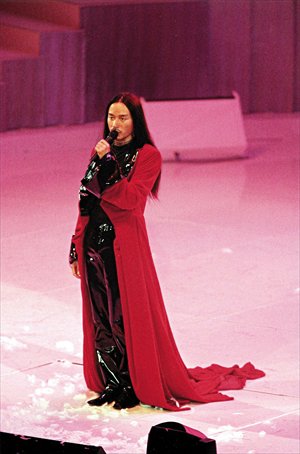The cruelest decade

Ten years on, fans recall singer/actor Leslie Cheung
"Leslie, I cannot go to [Hong Kong] for your 10th anniversary. I can only fold you 100 hearts, hoping you will stay free of worry," a netizen wrote in an online forum recently, followed by pictures of the red paper hearts she had made.
As April draws near, fans of the late singer and movie star are going through a hard time - again. "April is the cruelest month," American poet T.S. Eliot stated in The Waste Land. Though hardly related, many find it resonates, because it was in the cruelest month they lost Leslie Cheung.
On April 1st in 2003, Cheung jumped to his death, attaching a new meaning to the Western festival April Fool's Day. The day set aside for joking suddenly became forever painful for those who loved him. Ten years on, the yearning continues, reflected in the numerous activities to commemorate the idol.
Love goes on
Memorial activities for Cheung have surged around every April 1st since his death, but the 10th anniversary looks particularly ceremonious. Florence Chan, Cheung's former manager, has organized a series of activities to honor his memory. The most eye-catching one is the Miss You Much Leslie concert on March 31 at which more than a dozen big Hong Kong stars will perform Cheung's hits. Three thousand 1/6th scale figurines of Cheung decorated with a director chair are also created to realize his dream of being a director.
Chan said it will be the last time for her to hold a public memorial activity for Cheung. She said she will reveal an important message from Cheung about himself to start the concert. "It is his last message for us," Chan said, as quoted in many reports.
While people are left to guess what the message is about, Cheung's fans are flocking to Hong Kong to remember him. Alongside the fever in Hong Kong are spontaneous commemorations in the mainland, far away from the land of Cheung's birth and death. A concert named Wind Blows On will be held on April 1st in Beijing. And some of Cheung's films and concerts will be rebroadcast around the date.
Meanwhile, books about Cheung's music and movies and life are being published. Jiang Lin, who just finished a book focusing on Cheung's music, told the Global Times that his book shows respect for Cheung. "I love his music and movies. As a literary man, the best way to commemorate him is to write a book."
A legend in his time
Born into a middle-class family in 1956, Cheung became one of the most influential singers, actors and musicians in Asia and Chinese community worldwide. As a pioneering figure in Cantopop, many of his hits became classics throughout the decades.
Cheung entered the entertainment industry in 1977. But he had a rough start. He was booed off the stage at some performances. He didn't rise to fame until the 1980s, when many of his songs became hits, won awards and started another wave of Cantopop.
Cheung was equally successful on screen. He acted in about 60 movies over 24 years. Many of his movies, including Happy Together, Farewell My Concubine, Days of Being Wild, have become classics that can scarcely be surpassed.
Farewell My Concubine was the first Chinese film to win the Golden Palm award at the Cannes Film Festival. The success of the film and others won Cheung global fame as a movie star, and he was nominated for acting awards at the Cannes and Venice film festivals.
People are impressed with his talent, but those who love him see more of his personal charm. They saw a transparent artist refusing to hide behind masks. Those who worked with him saw a dedicated professional and industry model. To his friends and juniors, he was a supporter and mentor always ready to help.
He could be even more. Rong Xueyan, a fan for 25 years, said that at age 11 he was impressed by Cheung for overcoming hardships in his early years. He still remembers the amiable Cheung that he met several times. "Now he has become a symbol or even a totem, touching and influencing people in different ways."
Echoing influence
Cheung is now recalled as a perfect person, but he didn't live without controversy while pursuing his true self both in his career and personal life. Rumors of his sexual orientation filled the Hong Kong tabloids in the 1980s. Finally, in 1997, Cheung revealed that Daffy Tong and his mother were his "most beloved."
He was one of the few public figures in Hong Kong who dared to come out of the closet. Luckily, the public accepted his relationship with Tong because it showed loyalty and devotion over an 18-year period.
Due to his popularity and influence, Cheung's identity as a gay man has been regarded as improving the acceptability of homosexuals both in Hong Kong and the mainland.
"His fans continue to support him and they got to know more about this group (gays) and understand them," Ray, a gay man in Beijing, told the Global Times, "That's the positive energy he brought to us."
What's more, since his death was linked to long-term suffering from depression, Chinese society began paying closer attention to the illness, Rong said.
As director of Leslie Cheung Artist Studies, Rong is engaged in philanthropy through the organization. He plans to go to Hong Kong on March 30 to hold a charity sale. The proceeds will go to Children's Cancer Foundation.
"What touches me most is that Cheung is still influencing people in a positive way. Since he paid great attention to charitable causes while alive, many fans have become volunteers for charities," he said.
Amid the countless activities, Rong is most concerned about the over-consumption of Cheung. As seen from his character, he would prefer that people pay more attention to his works, rather than excavating his privacy, Rong said.